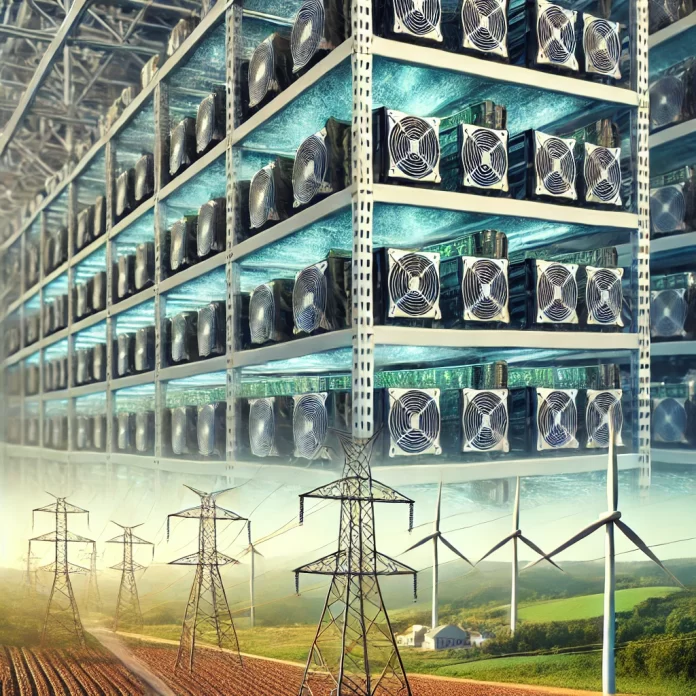Introduction
Cryptocurrency mining, a once-niche activity, has evolved into a global phenomenon with significant economic and environmental implications. In Iowa, the boom in cryptocurrency mining has brought both optimism for economic growth and concerns about its potential strain on energy resources. As more companies set up mining operations across the state, the debate intensifies: Is cryptocurrency mining a sustainable source of economic development, or will it place undue stress on Iowa’s power infrastructure?
The Cryptocurrency Mining Process
At the heart of this issue is the mining process itself. Cryptocurrencies like Bitcoin and Ethereum rely on a decentralized system where transactions are verified and recorded on a blockchain through complex cryptographic calculations. These calculations are performed by powerful computers, known as mining rigs, which require immense computational power to solve mathematical puzzles and generate new coins. As more coins are mined, the puzzles become more complex, demanding even more energy.
Iowa has become a hub for cryptocurrency mining operations because of its relatively low energy costs and a growing network of data centers. The state’s abundant wind energy resources and investment in renewable energy infrastructure also attract mining companies seeking to minimize their carbon footprint while maximizing profitability. However, despite these advantages, the scale of energy consumption required for mining has sparked concerns about its long-term sustainability.
Economic Benefits For Lowa
On the surface, the influx of cryptocurrency mining businesses seems like a win for Iowa’s economy. Mining operations bring jobs to local communities, particularly in rural areas that have struggled with economic stagnation. The construction of data centers and mining facilities has also led to significant investment in the state’s infrastructure, creating opportunities for local contractors and suppliers.
The tax revenue generated from these operations can be substantial, providing additional funds for public services and local development. With cryptocurrency mining being a rapidly growing industry, there is potential for Iowa to position itself as a key player in the digital economy. Proponents argue that the state’s investment in renewable energy could make cryptocurrency mining a green industry, with Iowa leading the way in sustainable practices.
Moreover, some experts suggest that cryptocurrency mining could serve as a stabilizer for Iowa’s energy grid. During periods of surplus energy production, such as when wind farms generate excess electricity, mining operations could absorb this surplus, preventing waste and making the energy grid more efficient. This model could help balance energy supply and demand, reducing the state’s reliance on fossil fuels and promoting further investment in renewable resources.
Environmental And Energy Concerns
Despite these benefits, the environmental impact of cryptocurrency mining cannot be ignored. Critics argue that mining operations consume an unsustainable amount of energy, exacerbating existing challenges in managing the state’s power grid. According to a 2023 report from the University of Cambridge, the global energy consumption of Bitcoin mining alone exceeds the total annual energy use of some small countries. With the growth of mining operations in Iowa, many fear that the state’s energy infrastructure could become overwhelmed.
In rural communities, where mining facilities are often located, residents have raised concerns about the noise, heat, and air pollution associated with large-scale mining operations. Additionally, the high energy demands of mining can drive up electricity prices for local residents and businesses, particularly in areas where the power grid is already under strain.
Another issue is the carbon footprint of cryptocurrency mining. While Iowa is a leader in renewable energy production, much of the electricity used by mining operations still comes from non-renewable sources. As mining companies increase their operations, the pressure on the state’s power grid could force utilities to rely more heavily on fossil fuels to meet demand, undermining Iowa’s progress in reducing its carbon emissions.
The Sustainability Debate
The question of whether cryptocurrency mining can be sustainable in Iowa largely depends on how the state and industry stakeholders address the energy consumption issue. Some industry leaders are pushing for greater investment in energy-efficient mining technologies, such as liquid immersion cooling, which reduces the amount of heat generated by mining rigs and improves their efficiency. Additionally, efforts are underway to develop mining operations that run entirely on renewable energy, reducing their reliance on fossil fuels.
However, achieving sustainability in cryptocurrency mining will require more than just technological advancements. It will also require careful planning and regulation to ensure that mining operations do not place an undue burden on Iowa’s power grid or local communities. Policymakers will need to strike a balance between encouraging economic growth and protecting the state’s energy resources.
Some experts suggest that Iowa could implement energy consumption limits for mining operations or require them to offset their carbon emissions by investing in renewable energy projects. Others propose the creation of a tiered pricing system for electricity, where mining companies would pay higher rates during peak demand periods, incentivizing them to operate during off-peak hours when energy is more readily available.
Conclusion
Cryptocurrency mining in Iowa presents a double-edged sword. On one hand, it offers the potential for economic growth, job creation, and increased tax revenue. On the other hand, its energy-intensive nature poses significant challenges for the state’s power grid and environmental goals.
The future of cryptocurrency mining in Iowa will depend on the state’s ability to manage these challenges and ensure that mining operations can coexist with the broader community’s needs. As the debate over energy consumption and sustainability continues, Iowa will need to navigate the complex trade-offs between economic development and environmental responsibility.
